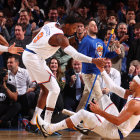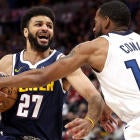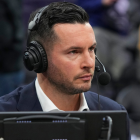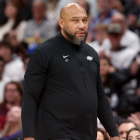
NEW YORK -- If you have played for Erik Spoelstra, then you have heard him talk about "relief points." These are "all the buckets that you aren't necessarily drawing up a play to get, they just happen throughout the course of the game," said Miami Heat center Cody Zeller. Leak-out dunks. Easy buckets after forcing turnovers or grabbing offensive rebounds. Free throws when you're in the bonus.
"Anything that you can get in those random areas a lot of times can be difference-makers," Spoelstra said.
Relief points are particularly important in the playoffs because everybody knows everybody's plays and the game tends to slow down. Against good defensive teams, finding a high-quality look in the halfcourt every time down is a lot to ask.
"We don't want to put that much pressure on our offense the whole game," Miami's Bam Adebayo said.
It is about finding "those areas in between, where you can capitalize on six or eight points in transition, a couple of second-chance points," Heat wing Duncan Robinson said. When they took home-court advantage from the New York Knicks in Sunday's series opener, they got six easy points directly off of Kevin Love's deep outlet passes.
"I'm sure they've watched all those outlet passes," Spoelstra said at morning shootaorund before Game 2 on Tuesday. "I'm sure they'll be well-schooled getting guys back. We'll have to find hopefully some other ways where we can generate some easy baskets before the defense gets set."
The Knicks did get guys back and, unfortunately for Miami, it could not generate easy baskets before the defense got set. Despite the absence of star Jimmy Butler, who was sidelined with a sprained ankle, the Heat did many things well on Tuesday -- they generated tons of 3s, took care of the ball and protected the rim -- but they didn't score a single fast break point. They didn't find much relief through second-chance opportunities (seven points on 2-for-7 shooing) or at the free throw line (12 for 17), either.
Sometimes, "you look at it at the end of the game, and it's like, 'Man they won that game because they got X amount of relief buckets,'" Adebayo said. In this case, the Heat lost largely because the Knicks got more than they did. In the halfcourt, Miami scored 110.3 points per 100 possessions in Game 2, which is 3.6 per 100 better than New York managed, per Cleaning The Glass. The Knicks came away with a 111-105 win, though, because they grabbed more offensive rebounds and picked up a few points in transition.
"The deciding factors," Spoelstra said, were the second-chance points New York found in the fourth quarter. "The things that we take pride in -- ball in the air, ball on the floor -- they pretty much dominated that [in] those last six minutes."
With less than six minutes to go, a Knicks possession appeared to be going nowhere. Then Julius Randle put the ball on the floor and found Isaiah Hartenstein for a floater. It didn't go in, but Heat guard Kyle Lowry was called for a loose ball foul on the rebound and then the Knicks generated four more shots on the same possession, which ended with Josh Hart making a 3-pointer to tie the game.
"It felt like a four-minute possession," Spoelstra said.
To Miami, this was a nightmarish momentum swing. To New York it "kind of showed who we are as a team," Hartenstein said. "No matter what happens, I think we stick together and we just keep going."
Hart said that "stuff like that, especially late in games," energizes the team and the crowd. "That helps winning. That is winning."
The Knicks led by four when Hart missed a wide-open corner 3 with about a minute left. Hart came away with the rebound, though, and when he missed his follow-up, Randle got the board and got fouled.
New York was in dicey territory for most of the game. Jalen Brunson, playing through an ankle injury, shot 1 for 6 in the first half, then found his way to 30 points. Randle, also playing through an ankle injury, started and finished the game by making good passing reads against a loaded defense, but he forced some shots in the middle. It took the team a while to adjust to the Heat's zone defense, and it was fortunate that Miami only made 17 of its 49 3-point attempts.
For the Knicks, a close call against a team missing its franchise player is not exactly a cause for celebration. It is, however, a sigh of relief.






















